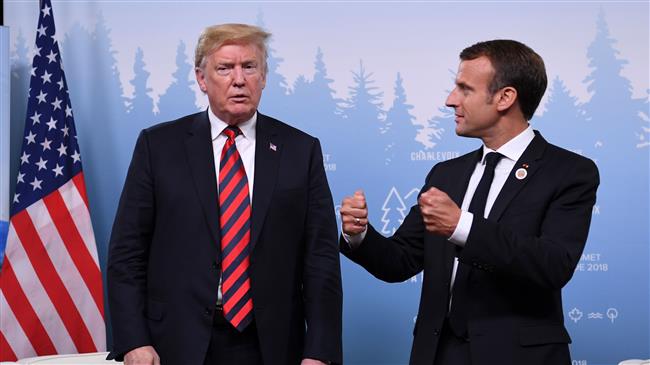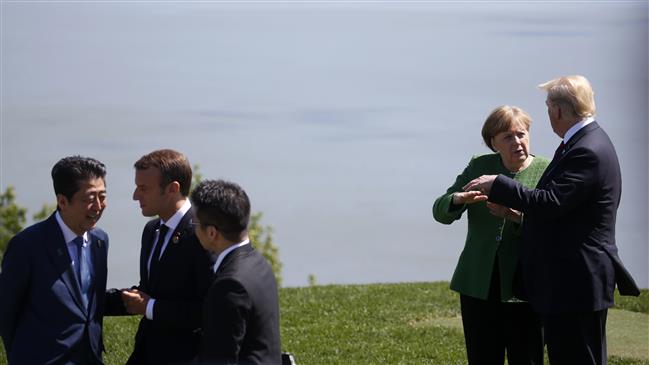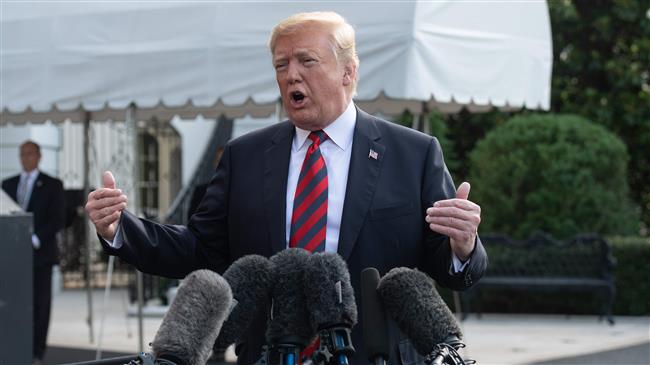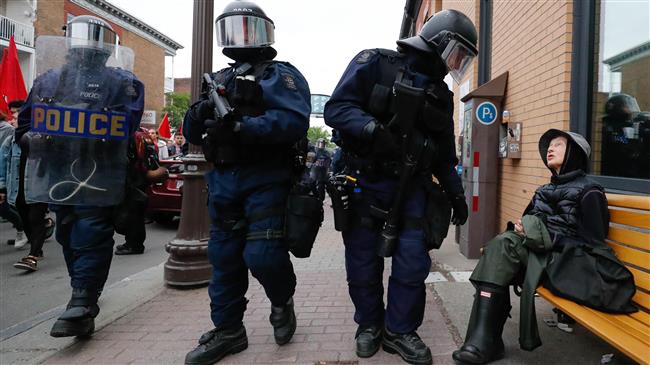Europe leaders unanimously reject Trump's call to Russia's return to G7: France
European members of the G7 industrial nations have unanimously rejected a call by US President Donald Trump for Russia’s readmission to the group.
French President Emmanuel Macron, German Chancellor Angela Merkel, British Prime Minister Theresa May and new Italian premier Giuseppe Conte agreed on a collective stance on Russia at the G7 summit in Quebec, Canada, said a senior aide to President Emmanuel Macron on Friday as cited in an AFP report.
"The common European position is against the return of Russia," said the unidentified aide while speaking to reporters, noting that the European leaders did leave open "the possibility of establishing dialogue" with Moscow.
Moscow was suspended from the G7 club in 2014 after Crimea joined Russia in a referendum.
Merkel underlined that European Union (EU) countries at the summit agreed that the conditions to readmit Moscow had not been met.

"We are in agreement that a return of Russia to the G7 cannot happen unless substantial progress is made in terms of the problems with Ukraine," Merkel said.
Trump made the surprise call for Russia’s return to the group’s pre-2014 “G8” formula prior to his trip to Canada.
"They threw Russia out. They should let Russia come back in because we should have Russia at the negotiating table," Trump said.
According to press reports, even US officials travelling with Trump expressed surprise by his suggestion and indicated that it was not planned. This is while Canada's Foreign Minister Chrystia Freeland emphasized that it had not been formally put on the G7 agenda.
The US president also slammed American western trade partners, saying "all of these countries have been taking advantage of the United States on trade."
"We have massive trade deficits with almost every country. We will straighten that out," he added.
Meanwhile, Donald TUSK, President of the European Council, viewed the call for Russia's return as part of a raft of unilateral measures imposed by Trump that have driven Washington apart from the US allies.
"It is evident that the American president and the rest of the group continue to disagree on trade, climate change and the Iran nuclear deal," Tusk emphasized.
Tusk further warned that "the rules-based international order is being challenged, quite surprisingly not by the usual suspects but by its main architect and guarantor, the US."
Russia, China cooperation at ‘unprecedented level’
Russian President Vladimir Putin told his Chinese counterpart Xi Jinping during a visit to China on Friday that cooperation between Moscow and Beijing is at an all-time high.
“Cooperation with China is one of Russia’s top priorities and it has reached an unprecedented level,” Putin said.
Xi also said the countries have “always firmly taken the development of relations as a priority direction.”
They have “resolutely supported the other’s core interests ... and jointly proactively participated in international affairs and global governance,” Xi added.
According to press reports, Russia and China have responded to the US national security strategy describing them as America’s top adversaries by pledging to further expand their economic, political and military cooperation.
The two leaders also signed a statement saying that “in conditions of a growing global instability and uncertainty” Russia and China will “deepen their consultations on strategic stability issues.”
They also vowed to “expand counter-terrorism cooperation,” boost contacts between their militaries and encourage joint international efforts to fight terrorism “without any double standards.”
The statement further censured Washington’s decision to pull out of the Iran nuclear deal and said they would try to keep it alive and ensure further trade with Iran.
VIDEO | Yemenis praise the military for its successful operations against Israel
VIDEO | Israel continues to bomb Gaza homes
VIDEO | An insider's view of the country: Meybod City in Yazd
‘All wars have rules. All of those rules have been broken’ by Israel
VIDEO | Report flags India’s violation of rights of Rohingya detainees
Turkey's foreign minister meets Syria's de facto leader in Damascus
VIDEO | US Syria plots
'Next to impossible' to rescue patients from Gaza's Kamal Adwan Hospital: Director














 This makes it easy to access the Press TV website
This makes it easy to access the Press TV website